Girls RAP and the Power of Connection, Self-Advocacy and New Opportunity
The Girls RAP program started in 1994 as a program to help youth identifying as girls who have been involved with the juvenile justice system.At that time, there were existing programs, but they were designed with boys in mind and were often rule-based and punitive in nature. Agencies began to take notice of the trend of more girls in the justice system and sought to develop a gender-responsive approach.
Compounding Challenges
Intersecting marginalized identities contribute to the challenges girls face. For example queer, gender non-conforming and trans youth make up somewhere between 5-10% of the overall youth population, but as much as 40% of the justice-involved youth population. Girls of color represent only 16% of girls in the nation’s schools but represent more than a third of all female school-based arrests.
Holistic Approach and Authentic Connections
When surveyed, girls shared that a nonjudgmental, caring adult and greater connection to self and community would have deterred their involvement in the justice system. A philosophy central to the Girls RAP program is the holistic approach. Girls not only address the challenges they are facing, but receive support by way of connection with adults and peers, which lasts them into the future.
“I feel wiser, more self-aware and more self-reflective. I know I’m not less than anyone, and I can thank Girls RAP for being a great support system while I was finding my way.” – Nessa, program participant
Group Discussions, One-on-One Support and New Opportunities
Using One Circle Foundation’s Girls Circle curriculum, Girls RAP staff facilitate groups once a week for 12 weeks with topics focused on an understanding of self, relating to others, and positive behaviors and choices. Youth also receive one-on-one support from counselors and opportunities for field trips, college visits and workshops after the program ends.
"The Girls RAP Program has really helped me see clearly and make better decisions so that I can have a better life." - Ricki, program participant
Communication and Self-Advocacy
Our hope for Girls RAP participants is that they will reflect back on the program discussions and activities, and they will have tools to resolve conflicts, manage anger and motivate themselves to achieve their goals and dreams. We want our girls to understand how important it is to love themselves and to embrace their stories – it is what sets them apart from others.
“It is important for girls to know how to effectively communicate and advocate for themselves because it can create a dynamic where people give them the respect they deserve and not treat them less than." - Shanika Lambert, Girls RAP staff
We've found that after graduating the program, 92% of the girls have an increased understanding of the consequences of their behaviors and 85% have no new offenses after one year. It's our hope that this program will last another 25 years and will continue to grow so that no girl goes unserved.




